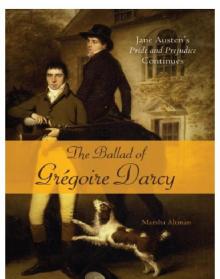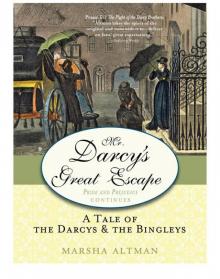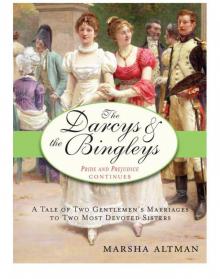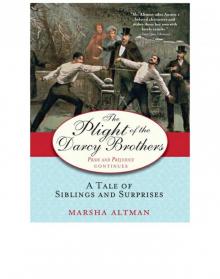- Home
- Marsha Altman
The Plight of the Darcy Brothers Page 27
The Plight of the Darcy Brothers Read online
Page 27
“May I remind you that your poor brother is a believer in the Church of England?”
“That does not make my question invalid.”
Darcy considered. “All right. But—we don't exactly have a booth here.”
“I suppose—we could put up the dressing screen from Elizabeth's room.”
“How did you know Elizabeth has a screen in her quarters?”
“I—I just assumed—”
Darcy admitted he liked watching Grégoire blush. “Just have them bring it.”
The screen was set up as a makeshift confessional barrier, and Grégoire took a seat on the other side. “I should point out that I am not, technically, a priest.”
“And I should point out that I am not, technically, a Papist.”
“Very well.” Grégoire cleared his throat. “Do you have any sins to confess?”
“What if I am a perfect man?”
“There is the sin of pride.”
“Very funny. Should I begin at the beginning? It will take an awfully long time if I cover everything you consider a sin.”
“What do you consider a sin, Mr. Darcy?”
Darcy sighed and shifted on the bed, which did nothing to lessen his pain. “When I was a boy, I was very unruly, very disrespectful to my elders. And Wickham… we got into terrible trouble. Well, not so terrible—boyhood pranks and the like.” He smiled. “I can remember some good times.”
“So you did care for him.”
“Yes, at times. It just—became more vicious. As we grew older, we fought.” He laughed, but it was more of a cough. “By Cambridge, I had given up on him. I could not follow his lead. Oh, and while this is confessional, I should mention I slept with a prostitute after he paid for her services so I would… enter into manhood, which you should try some time, by the way.”
“I am just your confessor now, Mr. Darcy.”
“You don't know what you are missing,” he said. “So… when Wickham was gone, when he was sent down, I was lost. I descended into the same debauchery he so enjoyed, only I was subtler about it. Then I met Charles, my last year, and desired to keep him away from the path where Wickham and I had strayed. But I was not always a good friend to him.”
“How?”
“I misled him. About Jane, when she was just Miss Bennet. I drove them apart.”
“But they did find each other again, not of your own design. And they are very happy.”
“Actually, I apologized to Bingley and pointed him back to her.”
“So you have repented thoroughly. Hardly a terrible friend.”
“And I was cruel to Elizabeth. My first proposal was most insulting.”
“Proposal?”
“For marriage, Monk. The thing normal people do.”
“Respect for the church is also an important virtue.”
“Depends on the church. So… and then there was that night—but I can't tell that story.”
“If it was a sin, you must.”
“Well, we didn't really… I don't remember what we did after the third bottle. But… enough. So there was my father.”
“Yes. What of him?”
“I fought with him, at the end, over Wickham. Now, looking back, how much it must have pained him that I wanted to disown my own brother.”
Grégoire said merely, “He did not tell you… therefore, you could not have known. While you were, I suppose, disrespectful in some fashion, you did not dishonor him in that. Did you not model your life after him? Did you not listen to his wisdom?”
“I have tried… every day of my life. With the one exception that I have been loyal to my wife since the day I first saw her eyes across a ballroom.”
“But yet, you cannot forgive your father?”
“No. Is that a sin?”
“Forgiveness is a virtue, hatred a sin.”
“I don't hate him. I just—do not comprehend his actions. He was so virtuous and yet did such great sin.”
“We cannot all be saints, Mr. Darcy.”
“Are you asking me to forgive my father?”
“I am not asking. But I think it would bring you comfort to begin to let the past be the past.”
“Yes, the past.” Darcy frowned. “There is the matter that I killed my own brother.”
“Did you not do it to save my life? And your own?”
“That does not change the fact that I did it.”
“So it seems there are two people you must forgive, if you are to find peace, and one is yourself,” Grégoire said. “At this point I would say, 'my son,' but that feels odd.”
“Indeed.”
“You have lived, by all accounts, a virtuous life as a good gentleman, a father, a husband, a friend, a son. The amount of family that surrounds you even now is… overwhelming. They have forgiven you, if they ever thought you were in the wrong in the first place for your actions with George. Now you must forgive yourself. You cannot take this self-torture with you now.”
“You are the expert on self-torture,” Darcy said.
“I will not dignify that with an answer. Darcy, you know what I mean. I am told George died begging forgiveness. For you, from your family, it has already been granted, and God grants it now, but only if you forgive yourself.”
“That… that you cannot ask of me.”
“I am perfectly capable of asking. The reply is up to you.”
Neither master nor mistress got much sleep that night. Darcy, because he was in such pain, and Elizabeth, because it was hard to sleep while clutching him so tightly and yet still trying not to hurt him. “So you shall know,” she sobbed, “if you die, I will kill you.”
“I must point out that that is technically impossible.”
“Then I will have your tombstone signed with that awful nickname where Fitzwilliam should be.”
“I will have to do my best not to die, then,” he said, but despite it, they could not lighten the mood. The rest of Darcy's night was spent going back and forth between the chamber pot and the bucket.
In the morning, Darcy was dizzy and feverish and so nauseous that his manservant had to physically make him drink his morning linseed and barley water.
Holding up a glass, Dr. Maddox said, “Drink.” He seemed cruel and unrelenting.
“My God. What is that?”
“Do you really wish to know?”
“Yes!” Darcy shouted, and then shook his head to try and clear his senses. “Excuse me. I am not sleeping well.”
“I am sorry, Darcy.” Dr. Maddox passed him the glass, and waited for Darcy to drink before answering him. “It's castor oil, mucilage of gum acacia, fennel water, and tincture of jalap.”
“Terrific.” Darcy lifted the glass. “Do I even want to know what this is going to do to me?”
“No.”
Darcy laughed; at least the doctor was honest.
Darcy could not tell if the pain was dissipating in his back. It seemed to be better when leeches were applied over the area, as unsettling a feeling as it was while the treatment was occurring. His days and nights seemed to be irrelevant. He shut his doors to visitors, as he could not hold even the briefest conversations without needing to excuse himself. If the tonics were determined to force everything out of his body to free him from inflammation, they were certainly trying.
There were times when he was too dizzy to focus his eyes, and not just at night. He pushed Elizabeth away—he didn't want her to see him like this. He couldn't sleep in his bed without her, but he couldn't sleep anyway. He would just collapse somewhere before the bed, and the servants would lift him up and make him drink. Beyond that, nothing.
Darcy did not truly fall asleep. He was familiar with the feeling of drifting into a feverish haze. The pain did not leave him and at times could be intense, but it was distant and he wasn't sure it was real. He felt between worlds, not literally. Some part of his brain knew it was all the power of days of this regimen to rid his body of inflammation.
“So logical.”
; Darcy sat down next to Wickham. The fire in front of them was roaring. He had a special affection for the ancient fireplace in their shared dormitory at King's College. It was older than Pemberley, dating probably to the foundations of the college, and it had a very medieval feel but yet still kept them warm in the cold winter months. The armchairs had been restored many times, and with two young hounds, given to him by his father for Christmas, nipping at his shoes, his regular homesickness was somewhat abated.
“Excuse me for adhering to reason,” Darcy said. Sitting back did not relieve or affect the quite literal stabbing pain in his back.
“Darcy?” said Maddox. “Drink this. No, it won't make you sick. It's just water.”
“What?” said Wickham.
“Nothing,” said Darcy.
“Oh. Whiskey? Single malt.”
“Anything decent?”
“I have standards, Darcy. They might not be as high as yours, but trust me when I say this is a fine whiskey. Have a glass.”
Darcy picked up his glass and allowed Wickham to pour. It was tasteless and very fine at the same time.
“You know what it reminds me of? Guess.”
“I prefer not to think about what occurs in your mind, Wickham.”
“You think me more perverse than I actually am. Which means you must think me a regular Nero.”
“Have you actually been studying your books? Can you actually read?”
Wickham ignored the question. “Loch Lomond. Remember, when Father took us to Scotland?”
“Oh, no. I had a terrible fever and did not go. You went with Father and Mr. Wickham. And that must have been… Georgiana was not born.”
“No, I don't believe so. Father let me have just a bit of whiskey at the distillery.”
“Which father?”
Wickham just laughed. His face was lit up from the fire, and when he smiled, he did have the appearance of being charming. He had perfected it over the years; Darcy was outright jealous of his social ease. The future master of Pemberley could barely manage a grin in public, and only when he had overheard a snippy remark.
“All right, try this. New Year's. We were—I was eight, you were nine.”
“Oh God! Was it that New Year's? The one where you convinced me to stay up past our bedtimes and drink half a bottle?”
“It was more than half, and it was your idea.”
“Certainly not!”
“Remember, this was before you had that stick up your arse and were actually a bit of fun.”
Despite himself, Darcy chuckled. “Ah, yes. And we suffered for it.”
“We had to hide it from Nurse—”
“She thought us ill for having terrible headaches. We had to stop her from bringing a doctor in.”
“Ha! That was hilarious!” but he was cut off by a moan he could not prevent.
“Is it terrible?”
“I am told I have only a small chance of surviving.”
“Then you'd best drink up.”
Darcy did not contradict him, no matter how unsubstantially the alcohol affected him. “Why are you being so kind to me?”
“We are brothers, are we not?”
Darcy, again, could not contradict him.
“Were we not always, however unintentionally?”
“We were certainly terrible at it.”
“Sibling rivalry is a long-standing tradition in almost any family. Especially one where the cards are so stacked against one.” Wickham circled the glass with his hand and took a sip. “Though, I suppose, now that I think about it in hindsight, I would have made an awful Master of Pemberley.”
“On this I feel I can soundly agree.”
“I would have despised all of that responsibility. I would have had trysts with the maids after marrying some girl who was pretty and only after me for my money, instead of your sensible marrying of Elizabeth Bennet; thereby creating the same crisis that we all had to endure, even the little monk.”
“His name is Grégoire.”
“So French.”
“His mother was.”
“Ah, yes. But I imagine I would have left so many that we could have had a proper battle instead of a duel, with tactics and everything. Two armies of bastard sons.”
Despite it, Darcy had to chuckle.
“God, Darcy, you are—well, I might say, pleasant when you're delirious.”
“That stick is still there, Wickham, or I suppose I should say, George.” He stared down into his glass, finding it hard to focus his eyes. “Father always wanted me to call you that.”
“Father always wanted me to call you Fitzwilliam.”
“You opted instead for insulting nicknames… in front of women, too.”
“You know my mouth hurt for weeks afterwards from that? That was the last time I ever got between you and a girl with pretty eyes—Oh, I am wrong. But the second time, you defeated me soundly without even punching out one of my teeth, so an improvement on both sides. And you got to keep the woman.”
“As I am currently in the most pain I have ever been in and am quite sure you are merely a side effect of its hallucinative effects, my heart does not go out to you.”
“My heart is out. I think I left it on the road somewhere.”
“Thank you for that lovely image, Wickham.”
“We could have gotten along quite well, don't you think?”
“What, if you were not a gambler and a promiscuous man who stole the honor of what I must assume was an endless number of ladies, and I were not a proper gentleman with no patience for such improprieties?”
“If I had loosened up less and you had loosened up more, perhaps, we would have been at least bearable to each other. And do not hide for a moment behind this 'proper gentleman' business!”
“Are you implying I am not?”
“I think he's coming around,” Dr. Maddox's voice came in, booming in the room, though Wickham didn't hear it and continued undisturbed.
“You are a gentleman. I will not deny it. But you take it to extremes because you are… disabled.”
“Disabled?”
“You are afraid of people, Darcy.”
“I am not afraid of anything!”
“Perhaps a better word,” Wickham said. Darcy had forgotten that he could display a high degree of intelligence. But he was, after all, the son of Geoffrey Darcy. “Uncomfortable.”
“What do you mean?”
“People that you do not know. People that you do know, but lack the means to play that social dance, and I do not mean a literal dance, as you are quite accomplished in that respect despite your lack of practice.”
“I think I've just been insulted and complimented in the same breath.”
“It was not so much an insult. I was not saying you are stupid or mentally ill, but behind all of that propriety and stiff posture is a real man, waiting to get out. Or perhaps, you show him to Elizabeth. She is then a very lucky woman, because you can be quite pleasant if you wish to be, even likeable.”
“So,” Darcy said. “We have a man with no scruples but excellent social abilities, and the very opposite. And one killed the other.”
“It has not been established quite yet whether I returned the favor. It depends on your brother-in-law. You could not find a doctor with proper eyes?”
“He has an excellent record and has saved my life before.”
“I can't quite decide if that is good or bad for me. I did not mean to kill you, Darcy.”
Darcy sighed. “I cannot honestly say the same thing.”
“If I had not attacked Gregory—”
“Still,” He shook his head; that, he could manage to do. “My hatred was too deep for me to forgive, even when considering one of your mistakes was made by accident. Had you approached Georgiana more formally—”
“—Mrs. Reynolds would have said something.” George Wickham, of course, did not have this information. Or maybe he did; Darcy didn't question it. “And while that would have changed our lives, it would h
ave prevented the intended marriage, certainly.” He said in a softer voice, one that actually sounded concerned, “You know I never compromised her. Or even came close. I never laid a hand on her, except to escort her around Brighton.”
“I know.”
“But that does not unburden me—even with her forgiveness. Some things cannot be forgiven, however unintentional.”
“Or perhaps they can,” Darcy said. “You said she did.”
“Yes.”
“Then I must follow in her lead,” Darcy said. He raised his glass so he did not have to say it. “I feel as if… a terrible burden is off my shoulders.”
“Maybe they amputated them while we sat here in front of this pleasant little fire.”
“Be serious.”
“See, we are opposites. Like you and Bingley, only he meets your stringent requirements of virtue. Otherwise, we are partners in a strange friendship.”
Darcy raised his glass. “To brothers.”
“To brothers. And brothers must forgive and forget. Both of us.”
“Even for the most heinous of crimes?”
“As we both fall into that category, with attempted incest and fratricide, we must overlook them if we are to forgive each other at all.”
“Done, then.”
They clinked glasses, which shattered, along with his world.
“Darcy? Mr. Darcy, can you hear me?”
The picture came back into definition, instead of the haze before him. Dr. Maddox, his manservant, and his wife were across him. He had collapsed on the floor next to his bed. So talkative to the dead, he did not feel up to putting together an answer for the living.
Maddox touched his forehead. “His fever's broken. On two?”
They hauled him back up on the bed, onto fresh sheets, and changed his shirt again. It felt wonderful to be clean and dry. “Thank you,” he mumbled after Elizabeth offered a cup of coffee, of which he managed only a few sips.
“Do you feel ill?”
To his own surprise, he shook his head.
“How is your back?”

 The Knights of Derbyshire
The Knights of Derbyshire Other Tales: Stories from The Ballad of Gregoire Darcy
Other Tales: Stories from The Ballad of Gregoire Darcy The Ballad of Gregoire Darcy
The Ballad of Gregoire Darcy Mr. Darcy's Great Escape
Mr. Darcy's Great Escape The Darcys and the Bingleys
The Darcys and the Bingleys The Plight of the Darcy Brothers
The Plight of the Darcy Brothers The Road to Pemberley
The Road to Pemberley